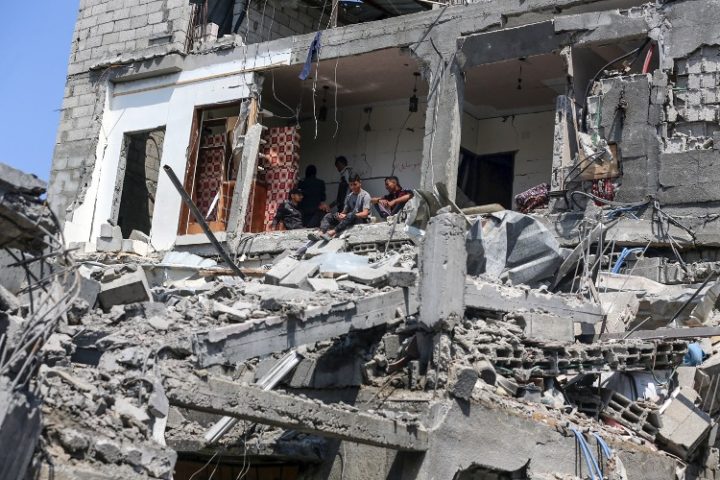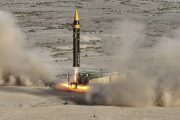
Hamas has dismissed all clauses of the latest hostage deal proposal, instead raising the number of Palestinian prisoners who have to be freed by Israel as part of the deal, per reports by The Times of Israel on April 14, citing a senior Israeli official.
The most recent proposal that Hamas disavowed called for a temporary ceasefire in the Gaza Strip in exchange for the liberation of Israeli hostages.
Israeli intelligence agency Mossad decried Hamas’ move, stating, “The rejection of the proposal by the three mediators, which included the most significant flexibility on Israel’s part, proves that [Yahya] Sinwar does not want a humanitarian deal and the return of the hostages, is continuing to exploit the tension with Iran, and is striving to unite the sectors and achieve a general escalation in the region.”
Mossad added that “Israel will continue to strive to realize the objectives of the war with Hamas with full force,” and “leave no stone unturned to return the 133 hostages from Gaza forthwith.”
According to another article by The Times of Israel, Hamas unveiled a proposal of its own, demanding Israel to cease the war in the first six-week phase of a three-phase process.
During the first six weeks, Hamas would not liberate any hostages. Israeli hostages would only be released during the second and third stages, with each stage lasting six weeks. In turn, Israel is to free considerable numbers of Palestinian prisoners.
Besides, the Hamas proposal stipulated that displaced Palestinians would be permitted to return unrestricted to northern Gaza during the initial six-week phase. Furthermore, the Hamas proposal also called for the withdrawal of the Israel Defense Forces (IDF) from all urban areas in the Gaza Strip.
Although truce negotiations began on April 7 in Cairo, no significant progress has been achieved thus far regarding a plan unveiled by U.S., Qatari, and Egyptian mediators. A week-long truce happened in late November, during which 105 hostages were liberated.
Former proposals have urged the liberation of around 40 “humanitarian” hostages, such as children, women, the elderly and the sick, during an initial six-week truce. Nevertheless, Hamas has rebuffed all these truce proposals and declared that any further hostage releases would hinge on Israel ending the war, pulling out all IDF forces, and permitting displaced northern Gazans to return to their homes. Israel has dismissed Hamas’ conditions, according to The Times of Israel.
The Times of Israel, citing Israel’s Channel 12 news, mentioned an unverified report (as of the time of writing) on April 15 that said Hamas was willing to liberate fewer than 20 “humanitarian” hostages.
In a post on X on April 16, Israeli Foreign Minister Israel Katz urged allies to categorize Iran’s Islamic Revolutionary Guard Corps (IRGC) as a terrorist organization after Iranian attacks on Israeli territory over the past weekend:
However, in an interview with French news outlet Le Monde on April 16, EU foreign policy chief Josep Borrell admitted that although “there have already been several discussions about putting the Revolutionary Guards on the list of terrorist organizations,” to classify the Revolutionary Guard as a “terrorist organization” would not be realistic for the moment.
Echoing a similar tune, U.K. Foreign Secretary David Cameron stated in an interview with Sky News on April 15 that Israel should “think with head as well as heart” in response to Iran’s weekend assaults, calling for Israel to exercise restraint to avert a rise in Middle Eastern hostilities.
“Of course if you’re sitting in Israel this morning you’re thinking quite rightly — ‘We have every right to respond to this’.… But we are urging that they shouldn’t escalate,” Cameron said, adding, “We’re trying to avoid escalation and the action we took alongside the Americans and others clearly has helped to stop that escalation because the Iran attack was an almost total failure.”
Russia’s Foreign Ministry also urged Iran and Israel on April 14 to exercise restraint to prevent a further intensification of regional animosities.
“We express our extreme concern over another dangerous escalation in the region,” Russia’s foreign ministry said in a statement on the Iranian attacks, as quoted by Reuters. “We call on all parties involved to exercise restraint.”
Russia pointed out that Tehran had said the attack was a legitimate act of self-defense in response to Israel’s strike on the Iranian embassy compound in Damascus on April 1, a move that Moscow denounced.
Russia also condemned Western efforts in preventing the UN Security Council from responding to the Israeli strike on the Iranian embassy compound.
“We have repeatedly warned that the numerous unresolved crises in the Middle East, primarily in the Palestinian-Israeli conflict zone, which are often fueled by irresponsible provocative actions, will lead to an increase in tension,” the ministry said, per Reuters reports.



